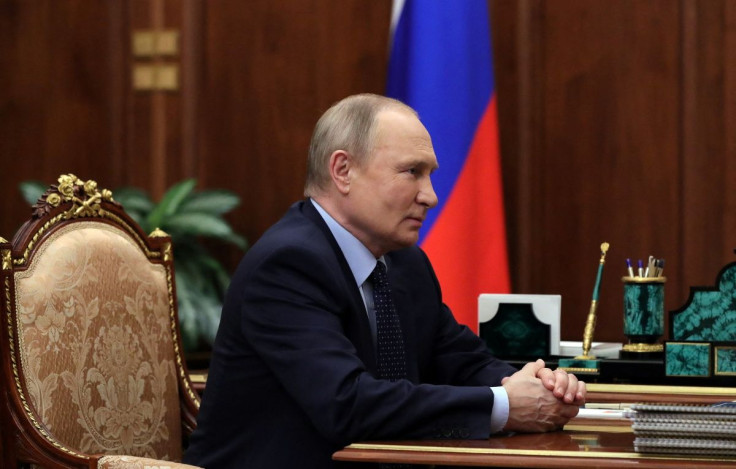Putin's Victory Day Speech Leaves No Clue On Future Escalation

Vladimir Putin exhorted Russians to battle in a defiant Victory Day speech on Monday, but was silent about plans for any escalation in Ukraine, despite Western warnings he might use his Red Square address to order a national mobilisation.
In Ukraine, there was no let-up in fighting, with Kyiv describing a stepped-up Russian offensive in the east and a renewed push to defeat the last Ukrainian troops holding out in a steelworks in ruined Mariupol.
Monday's annual parade in Moscow - with the usual ballistic missiles and tanks rumbling across the cobblestones - was easily the most closely watched since the 1945 defeat of the Nazis that it celebrates.
Western capitals had openly speculated for weeks that Putin was driving his forces to achieve enough progress by the symbolic date to declare victory - but with few gains so far, might instead announce a national call-up for war.
He did neither, but repeated his assertions that Russian forces were again fighting Nazis.
"You are fighting for the Motherland, for its future, so that no one forgets the lessons of World War Two. So that there is no place in the world for executioners, castigators and Nazis," Putin said from the tribune outside the Kremlin walls.
Ukraine's President Volodymyr Zelenskiy, in his own speech, promised Ukrainians they would triumph.
"On the Day of Victory over Nazism, we are fighting for a new victory. The road to it is difficult, but we have no doubt that we will win," said Zelenskiy, in plain army garb with his shirt sleeves rolled up.
In a clear reference to Putin, Zelenskiy added: "The one who is repeating the horrific crimes of Hitler's regime today, following Nazi philosophy, copying everything they did - he is doomed."
Putin's war has killed thousands of civilians, sent millions fleeing and reduced cities to rubble. Russia has little to show for it beyond a strip of territory in the south and marginal gains in the east.
Sheltering in a metro station in Kharkiv, Ukraine's mainly Russian-speaking second city which has been bombed relentlessly since the war's first days, World War Two survivor Vira Mykhailivna, 90, buried her tear-stained cheeks in her palms.
"I didn't think this could ever happen to us," she said. "This day was once a great celebration."
Kateryna Grigoriyevna, 79, a retired bank manager who has spent 10 weeks underground in the cavernous station, sat eating an ice cream she had ventured out to buy for Victory Day.
"We hate Putin," she said, glancing around the platform where some 200 people cluster in tents and on thin mattresses.
"I would kill him myself if I could."
'ONLY DISHONOUR, AND SURELY DEFEAT'
The Soviet victory in World War Two has acquired almost religious status in Russia under Putin, who has invoked the memory of the "Great Patriotic War" throughout what he calls a "special military operation" in Ukraine. Western countries consider that a false analogy to justify unprovoked aggression.
"There can be no victory day, only dishonour and surely defeat in Ukraine," said British Defence Secretary Ben Wallace.
In Poland, the Russian ambassador was surrounded by protesters at a memorial ceremony and doused in red paint. Ambassador Sergei Andreyev, his face dripping and his shirt stained, said he was "proud of my country and my president".
After an assault on Kyiv was defeated in March by strong Ukrainian resistance, Russia poured more troops in for a huge offensive in the east last month. But Russian gains have been slow at best, and Western arms are flooding into Ukraine for an expected counter-attack.
Western military experts - many of whom initially predicted a quick Russian victory - now say Moscow could be running out of troops. A full declaration of war would let Putin activate reservists and send conscripts.
"What rhetoric Putin used in his speech is immaterial. If he didn't declare war, or a general mobilisation, that's what (is) important," tweeted Phillips O'Brien, a professor of strategic studies at Britain's University of St Andrews.
"Without concrete steps to build a new force, Russia can't fight a long war, and the clock starts ticking on the failure of their army in Ukraine."
The war still seems to enjoy strong public support in Russia, where independent journalism is effectively banned and state television says Russia is defending itself from NATO. Conscription would test that support.
Olga, participating in St Petersburg's "immortal regiment" commemoration march, said she feared for her student son.
"I'm really worried about him. Really. I know many mothers whose sons are now of conscription age ... They're trying to find any way to save their children from going to this war."
COMBING WRECKAGE
Serhiy Haidai, governor of Ukraine's frontline Luhansk province, said rescuers were trying to begin sifting through the site of a school in the town of Bilohorivka after a Russian attack believed to have killed 60 people there on Sunday.
Ukrainian forces were holding firm at the towns of Rubizhne and Popasna, major targets of Russia's advance, he said.
Ukraine's defence ministry said Russian forces backed by tanks and artillery were conducting "storming operations" at Mariupol's Azovstal plant, where hundreds of Ukrainian defenders have held out through months of siege. Civilians sheltering there have been evacuated in recent days.
The Russians were trying to blow up a bridge used for evacuations, to trap the last defenders inside, said Mariupol mayoral aide Petro Andryuschenko.
On the main eastern front, Ukraine's military command said in its nightly Facebook briefing that Russian forces were continuing attempts to take control of Rubizhne to create favourable conditions for a further assault on the towns of Lyman and Sievierodonetsk.
Just before the Red Square parade was broadcast, Moscow satellite television menus were briefly altered to show viewers messages condemning the Ukraine war.
"The TV and the authorities are lying. No to war," the messages said.
© Copyright Thomson Reuters {{Year}}. All rights reserved.





















